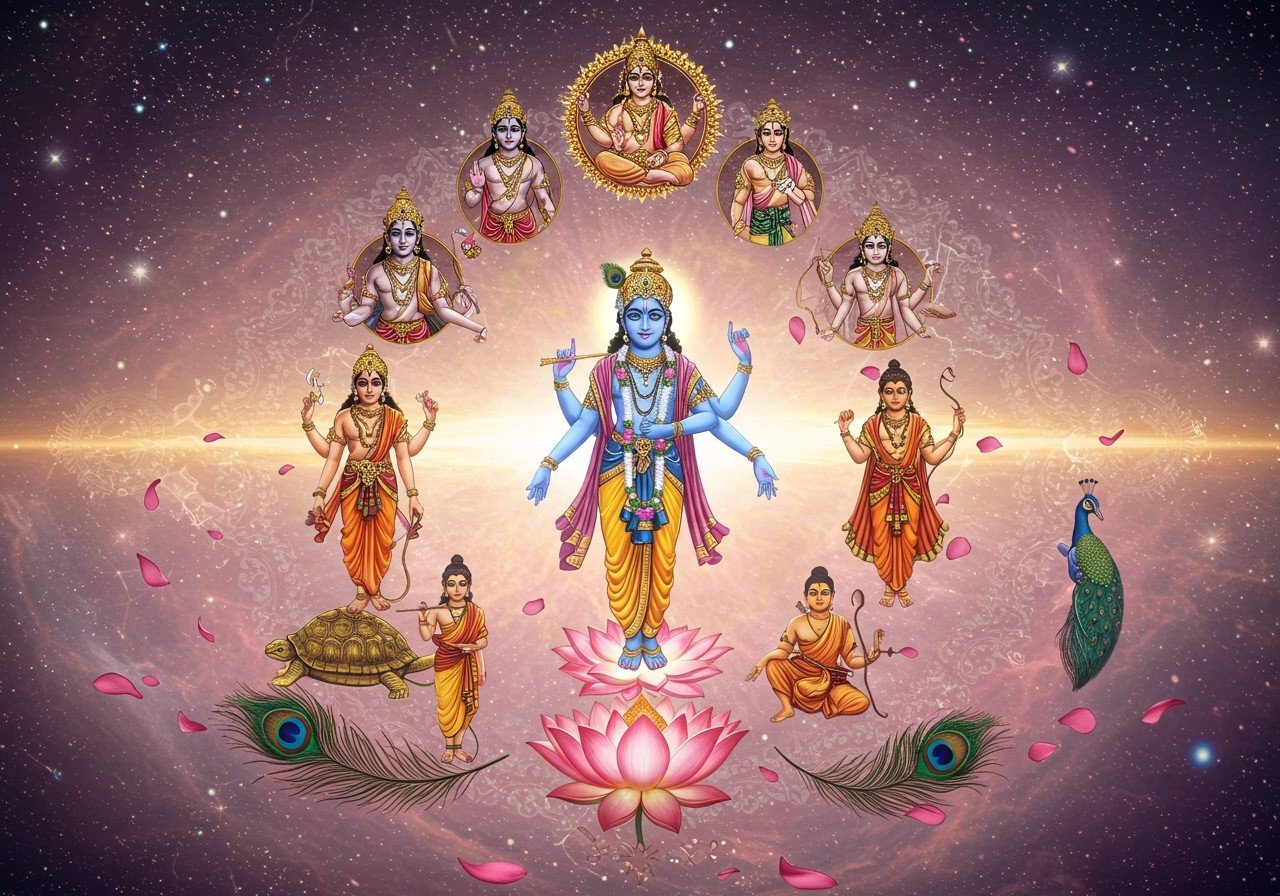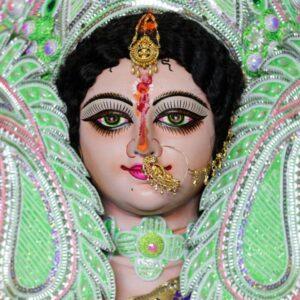
Delve into the fascinating world of Krishna’s ten avatars, known as the Dashavatara, and discover Krishna’s unique place within this divine lineage. This exploration unveils the cultural and spiritual significance of these incarnations for those seeking tradition and authenticity in their religious practices. Witness how these avatars have shaped Hindu mythology and continue to inspire worship and rituals today.
Understanding the Dashavatara
Dashavatara, meaning “ten descents,” refers to the ten principal avatars of Vishnu, the preserver deity in Hinduism. These divine incarnations appear throughout different epochs (yugas) to restore cosmic balance and uphold dharma (righteousness) whenever evil forces threaten the world. The concept of Dashavatara not only showcases divine intervention but also symbolizes the cyclical nature of time in Hindu cosmology and the evolution of life from aquatic forms to human beings.
Each avatar embodies specific qualities and addresses particular forms of chaos or evil. Ancient scriptures, such as the Puranas, narrate these captivating stories, providing profound insights into Hindu beliefs and traditions. For further exploration, consider resources like “The Dashavatara: The Ten Avatars and Their Role in Human Experience,” or “The Dashavatara: The Ten Avatars and Their Connection to Human Values” which offer detailed explanations of each avatar’s significance.
The Ten Avatars of Vishnu
1. Matsya (The Fish)
Matsya, the first avatar, rescued humanity and the sacred Vedas from a devastating flood, ensuring the continuation of knowledge and life. This act of preservation highlights the importance of safeguarding wisdom and ensuring the survival of mankind.
2. Kurma (The Tortoise)
Kurma, the second avatar, provided crucial support during the churning of the cosmic ocean (Samudra Manthan) to obtain the nectar of immortality (Amrita). This act symbolizes the divine support necessary for achieving spiritual liberation.
3. Varaha (The Boar)
Varaha, the third avatar, rescued the Earth (personified as Bhudevi) from the depths of the ocean where she had been dragged by the demon Hiranyaksha. This act signifies the restoration of balance and order to the world.
4. Narasimha (The Man-Lion)
Narasimha, the fourth avatar, a fearsome half-man, half-lion form, protected his devotee Prahlada from the tyrannical demon king Hiranyakashipu. This avatar embodies divine intervention to uphold faith and protect devotees from evil.
5. Vamana (The Dwarf)
Vamana, the fifth avatar, disguised as a dwarf Brahmin, subdued the arrogant demon king Bali, who had conquered the three worlds. This avatar teaches humility and demonstrates divine authority over worldly power.
6. Parashurama (The Warrior with an Axe)
Parashurama, the sixth avatar, a skilled warrior, eliminated corrupt and oppressive Kshatriya rulers, restoring righteousness and balance to society. He embodies the use of strength for a just cause.
7. Rama (The Prince of Ayodhya)
Rama, the seventh avatar, is the central figure of the epic Ramayana. His life exemplifies dharma, courage, and devotion as he rescues his wife Sita from the clutches of Ravana, the demon king of Lanka.
8. Krishna (The Divine Statesman)
Krishna, the eighth avatar, is a central figure in the Mahabharata, renowned for his wisdom, strategic brilliance, and divine playfulness. His teachings in the Bhagavad Gita offer profound philosophical insights into dharma, karma, and bhakti (devotion). Explore “Exploring the Significance of Krishna Avatar in Hinduism” for a deeper dive into his life and teachings.
9. Buddha (The Enlightened One)
Buddha, the ninth avatar, is revered for his teachings on compassion, non-violence, and the path to enlightenment. His inclusion in the Dashavatara emphasizes the importance of peaceful coexistence and spiritual awakening.
10. Kalki (The Future Warrior)
Kalki, the tenth avatar, is yet to appear. Prophecies foretell his arrival at the end of the current Kali Yuga, the age of strife and darkness, to restore dharma and usher in a new era of righteousness.
Krishna’s Unique Significance
Krishna is considered a Purna Avatar, a complete incarnation of Vishnu, embodying the fullness of divine power and wisdom. He played multifaceted roles – a divine statesman, a charioteer, a lover, a friend, and even a mischievous child. His teachings in the Bhagavad Gita provide profound philosophical guidance, illuminating the path towards righteousness and devotion. For visual representations, consider searching for “Vishnu Dashavatara Image”.
Krishna’s Influence on Culture and Spirituality
Krishna’s influence pervades Hindu culture, inspiring poets, artists, musicians, and dancers for centuries. Festivals like Janmashtami and Holi celebrate his life and teachings, bringing communities together in joy and devotion. His presence can be seen in temple architecture, iconography, and traditional storytelling forms like Harikatha and Kathakali. Poojn.in’s blog offers further reading on Hindu deities and rituals.
Krishna and the Dashavatara in Contemporary Practice
Krishna’s teachings and the Dashavatara narrative remain deeply relevant in contemporary Hindu worship. Pilgrimage sites associated with Krishna, such as Mathura and Vrindavan, draw devotees from around the world. Digital platforms disseminate these ancient stories to a wider audience, making them accessible to all. You can find beautifully crafted Radha-Krishna idols and brass Radha-Krishna murtis on Poojn.in, perfect for your home altar.
Poojn.in: Your Resource for Krishna and Dashavatara Worship
Poojn.in, India’s leading online store for cultural and religious goods, offers a wide selection of items to support your devotion to Krishna and the Dashavatara. Explore our collection of:
- Krishna Puja Sets: Comprehensive sets containing all the essential items for daily Krishna worship. These sets are designed for convenience and completeness, ensuring you have everything you need for your daily rituals.
- Krishna Idols: Exquisitely crafted idols of Lord Krishna in various sizes and materials, including brass, copper, and marble dust. Marble dust murtis are particularly popular for their intricate details and traditional aesthetic.
- Traditional Instruments and Accessories: Authentic flutes (bansuri), tulsi malas, and kanthi malas for enhancing your devotional practice. These items are crafted with care and reverence, connecting you to the rich musical and spiritual traditions associated with Krishna.
Poojn.in provides high-quality, authentic products to enhance your spiritual journey. Visit us today to explore our extensive collection and experience the convenience of online shopping for all your religious needs. You can also find related items like Lakshmi-Ganesh sets and brass Ganesh murtis to complement your Krishna worship.

